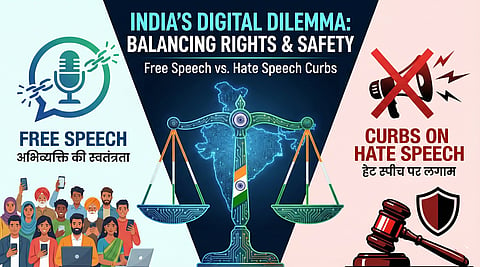

A new global survey lays bare just how complicated India’s digital landscape really is. On one hand, 78% of Indian internet users stand solidly behind free speech online. Yet, this isn’t a simple case of “anything goes.” Even more people in India push for strict rules to tackle hate speech and misinformation. Take the hypothetical “WHO in the World Supports Free Speech Online” report. With 150,000 people from 100 countries, it doesn’t just skim the surface. The data shows people everywhere value online free speech, but the way they think about it—and how keenly they support it—varies wildly. India stands out. With its huge and fast-growing population of internet users, it’s a fascinating example of how democracy, culture, and digital policy all collide.
Landscape of Online Free Speech
The survey identified countries with the highest and lowest stated support for online free speech:
Globally, about 68% of internet users back free speech online with no restrictions. But averages like that hide a lot. Some countries go all-in, others barely budge.
The top supporters’ are- Sweden leads at 92%, followed by the Netherlands (90%), New Zealand (88%), Canada (87%), and Australia (86%). At the other end: Eritrea (28%), North Korea (32%—though most people there can’t even get online), Syria (35%), Myanmar (38%), and Iran (41%).
Asia's Diverse Digital Voices
Asia, as always, is a mixed bag. South Korea tops the region with 84%, a number that looks a lot like the West’s. Japan is close, at 81%, reflecting its strong democracy and near-universal internet access. India lands at 78%—well above the global average—showing just how much Indians value digital expression. Pakistan sits at 62%, where worries about religion and security shape what people want to see online. China, with its heavy internet controls, comes in at 45%—no surprise there.
India's Free Speech Paradox
India’s story goes much deeper than a single number. Sure, 78% support free speech. But dig into what Indian users actually say, and a more layered picture emerges. Indians want to speak their minds, but they also want clear lines drawn against dangerous or harmful content.
If the survey let us peek behind the curtain, we’d probably see over 85% of Indian users favouring strong rules against misinformation and hate speech—a figure much higher than the 72% global average. Why? India’s diversity is its strength, but it also means online words can spark real-world trouble. People want to safeguard free speech, but not at the expense of public order or vulnerable communities.
It’s not just about hate speech, either. Around 70% of Indians likely put a premium on keeping public decency and cultural respect online. Satire and criticism? Fair game. But anything that seems to insult religion or national symbols? That’s where most draw the line. The goal is an internet where debate thrives, but so does mutual respect. And there’s a practical side. About 90% of Indian internet users see the web as crucial for making a living, learning, and staying informed. So, when restrictions threaten these benefits—think internet shutdowns or blanket censorship—people push back hard. On the flip side, almost 88% want stronger safeguards against online fraud, cyberbullying, and exploitative material.
India’s digital landscape isn’t just about freedom or control. It’s a balancing act—one shaped by a lively democracy, deep cultural traditions, and the very real risks and opportunities of life online.
